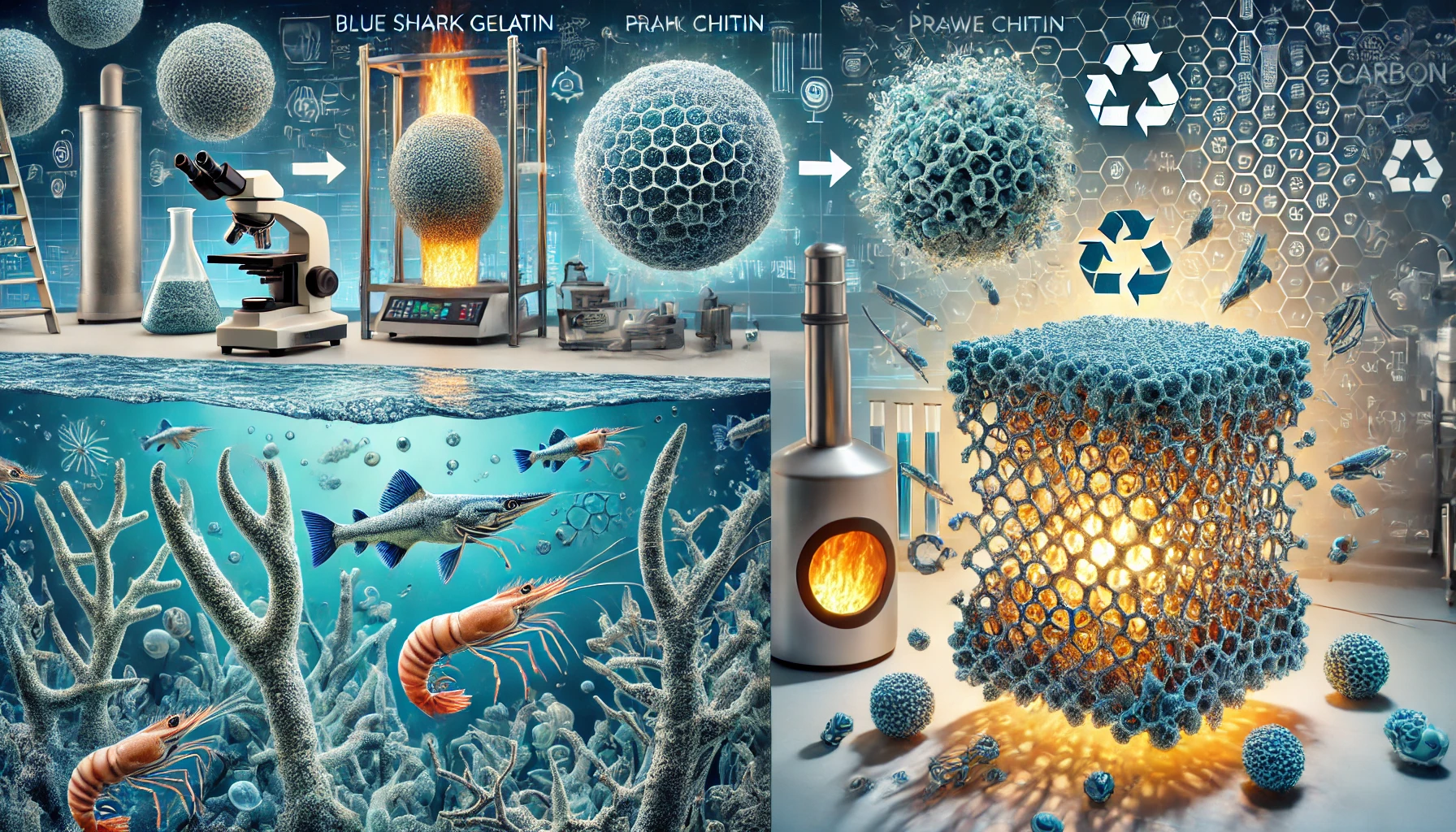Turning Marine Waste into Powerful Battery Solutions: A Sustainable Breakthrough
Researchers from the University of Limerick, the University of Porto, and the National University of Science and Technology Politehnica Bucharest developed sustainable carbon materials from marine waste to improve lithium-sulfur battery performance, addressing both energy storage needs and waste management challenges. The study shows these materials enhance battery capacity and stability, offering a promising alternative to fossil fuel-derived components.

A team of researchers from the University of Limerick in Ireland, the University of Porto in Portugal, and the National University of Science and Technology Politehnica Bucharest in Romania have made significant strides in the field of sustainable energy storage by exploring the use of marine waste materials in lithium-sulfur (Li-S) batteries. These researchers investigated the conversion of gelatin from blue sharks and chitin from prawns, both of which are byproducts of the seafood industry, into carbon materials that can serve as sulfur hosts in Li-S batteries. Their work not only addresses the critical need for sustainable and cost-effective materials in battery production but also offers a potential solution to the growing problem of waste management in the seafood industry. This study highlights a dual benefit: utilizing waste materials that would otherwise be discarded while advancing the development of next-generation energy storage devices.
Lithium-Sulfur Batteries: A Promising Alternative
Lithium-sulfur batteries are gaining attention as a promising alternative to the widely used lithium-ion batteries, primarily because of their potential to offer higher energy densities and lower costs. However, Li-S batteries face several challenges, including the insulating nature of sulfur and the polysulfide shuttle effect, which can lead to capacity loss and reduced cycle life. To address these challenges, researchers have been focusing on finding effective sulfur-hosting materials that can improve the performance and longevity of Li-S batteries. Traditionally, these materials have been derived from fossil fuels, which raises concerns about environmental impact and sustainability. In this context, the use of biomass-derived carbon materials, such as those produced from marine waste, offers an appealing alternative.
Turning Marine Waste into Valuable Resources
The research team employed a carbonization process to convert blue shark gelatin and prawn chitin into porous carbon materials. This process involved heating the materials at high temperatures in a controlled environment, resulting in the formation of carbon with unique structural properties, including high surface area and specific pore sizes. These properties are crucial for the effective trapping and retention of sulfur within the battery, which in turn helps to mitigate the polysulfide shuttle effect and improve the overall performance of the battery. The resulting carbon materials were then tested as sulfur hosts in Li-S batteries through a series of electrochemical experiments.
Impressive Results in Battery Performance
The study's findings were promising, demonstrating that the marine waste-derived carbon materials performed well as sulfur hosts in Li-S batteries. The batteries incorporating these materials showed significant capacity retention over 500 cycles, with the specific discharge capacities reaching up to approximately 700 mAh/g for the shark gelatin-derived carbon and 800 mAh/g for the prawn chitin-derived carbon. These results indicate that the biomass-derived carbon materials are capable of effectively trapping sulfur and preventing its loss during the battery's operation, which is a critical factor for the long-term stability and performance of Li-S batteries.
Sustainable and Cost-Effective Solutions
One of the key advantages of using biomass-derived carbon materials is their sustainability. Unlike fossil fuel-derived carbons, which rely on finite resources and contribute to environmental degradation, biomass-derived carbons are renewable and can be sourced from waste materials. This not only reduces the environmental impact of battery production but also supports the concept of a circular economy, where waste materials are repurposed for new applications. The research team's work underscores the importance of exploring alternative materials for energy storage applications, particularly those that offer environmental and economic benefits.
A Pathway Toward a Sustainable Future
In addition to their potential for improving battery performance, the marine waste-derived carbon materials also offer a cost-effective solution for the production of sulfur-hosting materials. The seafood industry generates significant amounts of waste each year, including approximately 100,000 tons of blue shark waste and 6 to 8 million tons of crustacean waste. By converting these waste materials into valuable carbon products, the researchers have identified a way to reduce waste while simultaneously contributing to the development of more efficient and sustainable energy storage technologies. The study conducted by the team from the University of Limerick, the University of Porto, and the National University of Science and Technology Politehnica Bucharest represents a significant step forward in the field of sustainable energy storage. By demonstrating the effectiveness of marine waste-derived carbon materials in Li-S batteries, the researchers have opened up new possibilities for the use of renewable and sustainable materials in energy storage applications. Their work highlights the potential of integrating waste management with advanced technology development, offering a promising pathway toward a more sustainable future. As the demand for energy storage devices continues to grow, particularly in applications such as portable electronics, electric vehicles, and grid storage, the need for sustainable and cost-effective materials will only become more pressing. This research provides a valuable contribution to the ongoing efforts to meet these demands while minimizing environmental impact and advancing the development of next-generation energy storage solutions.
- FIRST PUBLISHED IN:
- Devdiscourse










